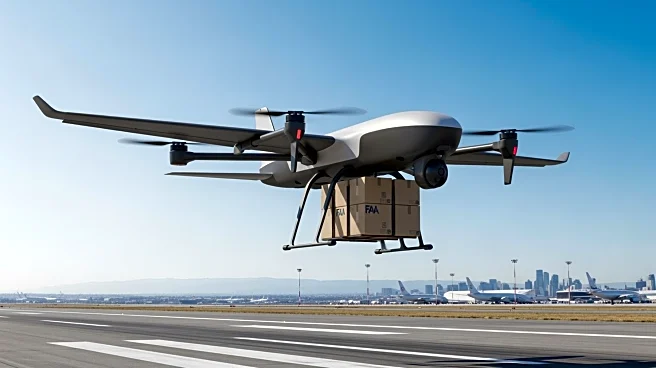What's Happening?
The Federal Aviation Administration (FAA) has announced a 10% reduction in flight capacity at 40 major airports, including Los Angeles International Airport (LAX), due to air traffic controller shortages stemming from a government shutdown. This decision
has already led to over 3,500 flight delays and more than 950 cancellations. The cutbacks are expected to disrupt the delivery of vital goods such as harvested organs, pharmaceuticals, and factory parts, which rely heavily on the air cargo system. The air cargo system, which includes major carriers like UPS, DHL, and FedEx, as well as passenger flights, is crucial for the timely delivery of high-value and time-sensitive items. The reduction in flights could significantly impact the supply chain, especially during the peak holiday season when demand for certain goods is high.
Why It's Important?
The reduction in flight capacity poses a significant threat to industries that depend on the rapid delivery of critical goods. The healthcare sector, in particular, could face challenges in transporting lifesaving pharmaceuticals and medical devices. Retailers may also struggle to meet consumer demand for holiday goods, potentially affecting sales and customer satisfaction. The logistics industry must adapt quickly to mitigate these disruptions, possibly increasing reliance on alternative transportation methods like trucking. The situation underscores the vulnerability of the air cargo system to external factors such as government shutdowns, highlighting the need for contingency planning and robust infrastructure to ensure continuity in supply chains.
What's Next?
If the government shutdown persists, the FAA may implement further flight reductions, potentially up to 20%, exacerbating the current disruptions. Stakeholders, including logistics companies and retailers, will need to explore alternative solutions to maintain supply chain efficiency. This may involve increasing the use of ground transportation or adjusting inventory strategies to accommodate delays. The situation may prompt discussions among policymakers and industry leaders about improving air traffic management and addressing workforce shortages to prevent similar disruptions in the future.
Beyond the Headlines
The flight cutbacks highlight broader issues within the aviation industry, such as workforce shortages and the impact of government policies on operational capacity. The reliance on air cargo for critical deliveries also raises questions about the sustainability and resilience of current logistics models. As industries adapt to these challenges, there may be increased investment in technology and infrastructure to enhance supply chain flexibility and reduce dependency on air transport.















